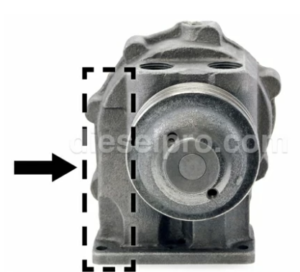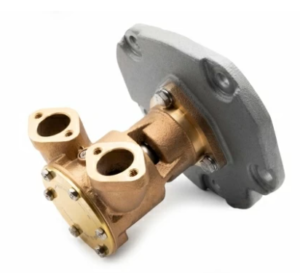Detroit Diesel 4-53 Engine Marine Detroit Diesel 4-53 Non-Turbo Component Maintenance Life
Component
Maintenance Interval (Hours)
Notes
Oil and Filter Change 100-150 hours Essential to keep the engine lubricated and functioning smoothly.
Fuel Filters 250 hours Replace regularly to avoid fuel contamination and injector issues.
Air Filters 250-300 hours Inspect frequently, especially in marine environments to avoid debris.
Coolant 1,000 hours Replace to prevent overheating and corrosion within the engine.
Injectors 1,500-2,000 hours Inspect and service injectors to ensure proper fuel atomization.
Valve Adjustment 1,000-1,500 hours Critical for maintaining efficient engine operation and performance.
Blower Maintenance 3,000-4,000 hours Essential for proper air-fuel mixture; inspect and service as required.
Cylinder Head Overhaul 4,000-5,000 hours Overhaul includes inspecting for cracks, wear, and proper sealing.
Piston Rings 4,000-6,000 hours Replace during overhauls to maintain engine compression and efficiency.
Crankshaft Bearings 6,000-8,000 hours Inspect and replace if there are signs of wear; critical during major service.
Complete Engine Overhaul 10,000-15,000 hours Involves major engine components; ensures long-term reliability and performance.
Marine Detroit Diesel 4-53 Non – Turbo Coolant System Specific Component Maintenance Life Water Pump for Detroit Diesel Engine 53 series Marine Water Pump for Detroit Diesel 53 Engine
Component
Maintenance Interval (Hours)
Notes
Coolant 1,000 hours Change to maintain optimal cooling and prevent corrosion in the system.
Freshwater Pump 2,000-3,000 hours Inspect for leaks, wear, and corrosion; replace seals or rebuild as necessary.
Raw Water Pump 500-1,000 hours Inspect impeller for wear; replace impeller and seals as needed to maintain proper cooling.
Thermostats 1,500-2,000 hours Inspect and test; replace if malfunctioning or during major coolant system service.
Marine Detroit Diesel 4-53 Turbo Component Maintenance Life
Component
Maintenance Interval (Hours)
Notes
Oil and Filter Change 100-150 hours Essential to keep the engine lubricated and functioning smoothly.
Fuel Filters 250 hours Replace regularly to avoid fuel contamination and injector issues.
Air Filters 250-300 hours Inspect frequently, especially in marine environments to avoid debris.
Coolant 1,000 hours Replace to prevent overheating and corrosion within the engine.
Injectors 1,500-2,000 hours Inspect and service injectors to ensure proper fuel atomization.
Valve Adjustment 1,000-1,500 hours Critical for maintaining efficient engine operation and performance.
Turbocharger 2,000-3,000 hours Regular inspection for wear; service or replace if performance drops.
Blower Maintenance 3,000-4,000 hours Essential for proper air-fuel mixture; inspect and service as required.
Cylinder Head Overhaul 4,000-5,000 hours Overhaul includes inspecting for cracks, wear, and proper sealing.
Piston Rings 4,000-6,000 hours Replace during overhauls to maintain engine compression and efficiency.
Crankshaft Bearings 6,000-8,000 hours Inspect and replace if there are signs of wear; critical during major service.
Complete Engine Overhaul 10,000-15,000 hours Involves major engine components; ensures long-term reliability and performance.
Marine Detroit Diesel 4-53 Turbo Coolant System Specific Component Maintenance Life
Component
Maintenance Interval (Hours)
Notes
Coolant 1,000 hours Change to maintain optimal cooling and prevent corrosion in the system.
Freshwater Pump 2,000-3,000 hours Inspect for leaks, wear, and corrosion; replace seals or rebuild as necessary.
Raw Water Pump 500-1,000 hours Inspect impeller for wear; replace impeller and seals as needed to maintain proper cooling.
Thermostats 1,500-2,000 hours Inspect and test; replace if malfunctioning or during major coolant system service.
This maintenance schedule helps maintain optimal performance and prolongs the lifespan of the 4-53 engine, especially in the demanding marine environment. Regular inspections and adherence to these intervals are essential for avoiding unexpected failures and costly repairs.
Disclaimer: The most accurate data for each specific engine will always be found in the OEM service manual. The numbers provided here are estimates and can vary based on operating conditions. Factors such as inadequate cooling, lubrication, or fuel quality issues can affect other engine components, potentially altering maintenance intervals. Engine components are interconnected, so one issue can impact others, leading to different service needs. Always tailor your maintenance approach to the specific conditions in which your engine operates.
Please follow and like us:






 Free US Calls: 1-888-433-4735
Free US Calls: 1-888-433-4735 International: 305-545-5588
International: 305-545-5588